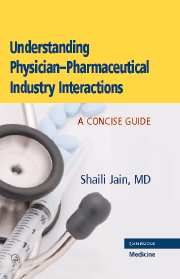Book contents
- Frontmatter
- Contents
- Acknowledgments
- Foreword
- Introduction
- 1 Gifts from the Pharmaceutical Industry to Physicians: Do They Influence your Prescribing?
- 2 Ethical Considerations of Receiving Gifts from the Pharmaceutical Industry
- 3 One on One: An Analysis of the Physician–Pharmaceutical Company Representative (PCR) Detailing Interaction
- 4 Medical Academia and the Pharmaceutical Industry
- 5 Teaching Physicians in Training about Pharmaceutical Industry Promotion
- 6 Continuing Medical Education: How to Separate Continuing Medical Education from Pharmaceutical Industry Promotion
- 7 Professional Policies on Physician–Pharmaceutical Industry Interaction (PPII)
- 8 Preserving Professionalism: Patients' Perceptions of Physicians' Acceptance of Gifts from the Pharmaceutical Industry
- 9 To Sample or Not to Sample? The Use of Pharmaceutical Industry–Supplied Medications in Medical Practice
- 10 Physician–Pharmaceutical Industry Interactions (PPIIs), the Law and the Media
- 11 Direct-to-Consumer Advertising (DTCA)
- 12 Pharmaceutical Industry Interactions with Health Care Professionals: A Global Perspective
- 13 Internet Resources for Teaching about PPII and Independent Sources of Information about Prescription Medicines
- Appendix I
- Appendix II
- Index
- References
12 - Pharmaceutical Industry Interactions with Health Care Professionals: A Global Perspective
Published online by Cambridge University Press: 03 March 2010
- Frontmatter
- Contents
- Acknowledgments
- Foreword
- Introduction
- 1 Gifts from the Pharmaceutical Industry to Physicians: Do They Influence your Prescribing?
- 2 Ethical Considerations of Receiving Gifts from the Pharmaceutical Industry
- 3 One on One: An Analysis of the Physician–Pharmaceutical Company Representative (PCR) Detailing Interaction
- 4 Medical Academia and the Pharmaceutical Industry
- 5 Teaching Physicians in Training about Pharmaceutical Industry Promotion
- 6 Continuing Medical Education: How to Separate Continuing Medical Education from Pharmaceutical Industry Promotion
- 7 Professional Policies on Physician–Pharmaceutical Industry Interaction (PPII)
- 8 Preserving Professionalism: Patients' Perceptions of Physicians' Acceptance of Gifts from the Pharmaceutical Industry
- 9 To Sample or Not to Sample? The Use of Pharmaceutical Industry–Supplied Medications in Medical Practice
- 10 Physician–Pharmaceutical Industry Interactions (PPIIs), the Law and the Media
- 11 Direct-to-Consumer Advertising (DTCA)
- 12 Pharmaceutical Industry Interactions with Health Care Professionals: A Global Perspective
- 13 Internet Resources for Teaching about PPII and Independent Sources of Information about Prescription Medicines
- Appendix I
- Appendix II
- Index
- References
Summary
The debate over physician–pharmaceutical industry interactions (PPIIs) is clearly a global one. The World Health Organization has published “criteria for medicinal drug promotion and the code of pharmaceutical marketing practice” for countries without national codes. The World Medical Association also published guidelines in 2004. The ethical and legal conflicts of PPII have been highlighted in the medical literature from Norway, Poland, Germany, Australia, Spain, India, Sri Lanka and Turkey.
The pharmaceutical industry interacts not only with physicians but also with other health care professionals such as nurses, nurse practitioners and physician assistants; with health care organizations such as HMOs; and with consumer organizations and pharmacists.
Pharmaceutical companies and patient organizations frequently come together to explore areas of shared interest. Some have argued that these offer the PI a chance to mobilize grassroots lobbying muscle to influence policymakers. Serious issues have recently been highlighted concerning undeclared interests in commercial funding of charitable and lay organizations without apparent conflict.
In addition, the PI relationship with HMOs, including rebate policies, formulary decision making, intervention activities, disease management programs and Medicaid rebate calculations, has recently come under federal scrutiny.
In Canada, potential patient identifiers and physician-linked prescription data stream from pharmacy computers via commercial compliers to pharmaceutical companies without the informed consent of patients and physicians.
- Type
- Chapter
- Information
- Understanding Physician-Pharmaceutical Industry InteractionsA Concise Guide, pp. 64 - 67Publisher: Cambridge University PressPrint publication year: 2007



